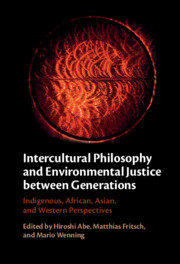 Intercultural Philosophy and Environmental Justice between Generations
Intercultural Philosophy and Environmental Justice between Generations A Confucian Relational Perspective
from Part II - Intergenerational Ethics in Dialogue with Confucianism and Daoism
Published online by Cambridge University Press: 14 March 2024
This chapter argues that certain conventional discourses of sustainability, along with related frameworks for intergenerational ethics, create conceptual barriers to realizing the goals of genuine sustainability and intergenerational flourishing. Early Confucianism provides a model of intergenerational ethics that may better align with these goals. In particular, early Confucianism offers a relationally grounded ethics that conceptualizes community diachronically and emphasizes the importance of building and sustaining harmonious, flourishing human communities over time. These Confucian ideas resonate with relational and communitarian approaches to intergenerational ethics and sustainability, which can helpfully supplement existing frameworks for intergenerational ethics by emphasizing shared values and concerns, including commitments to common intergenerational projects.
To save this book to your Kindle, first ensure [email protected] is added to your Approved Personal Document E-mail List under your Personal Document Settings on the Manage Your Content and Devices page of your Amazon account. Then enter the ‘name’ part of your Kindle email address below. Find out more about saving to your Kindle.
Note you can select to save to either the @free.kindle.com or @kindle.com variations. ‘@free.kindle.com’ emails are free but can only be saved to your device when it is connected to wi-fi. ‘@kindle.com’ emails can be delivered even when you are not connected to wi-fi, but note that service fees apply.
Find out more about the Kindle Personal Document Service.
To save content items to your account, please confirm that you agree to abide by our usage policies. If this is the first time you use this feature, you will be asked to authorise Cambridge Core to connect with your account. Find out more about saving content to Dropbox.
To save content items to your account, please confirm that you agree to abide by our usage policies. If this is the first time you use this feature, you will be asked to authorise Cambridge Core to connect with your account. Find out more about saving content to Google Drive.